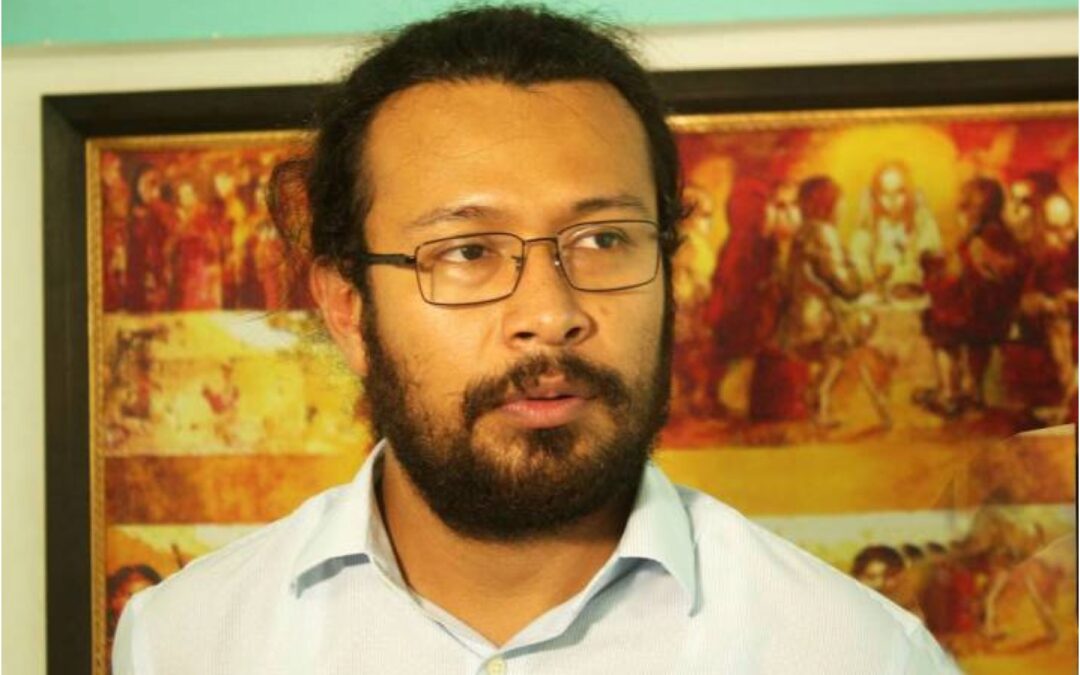
Oct 7, 2019 | Artículos, Noticias
La semana pasada el defensor de derechos humanos Germán Romero Sánchez recibió nuevas amenazas que estarían relacionadas con su labor de abogado defensor de víctimas de graves violaciones a los derechos humanos por parte de agentes estatales
En esta ocasión, las amenazas se realizaron a través de llamadas telefónicas a la residencia del abogado Romero. La primera llamada fue atendida por la compañera del abogado Romero a la cual le dijeron “no te voy a dejar vivo toda la vida, ¿oyo?”. La llamada se produjo minutos después de que el abogado Romero saliera de su casa a llevar a una de sus hijas al colegio.
Esta no es la primera vez que el abogado Romero recibe amenazas por su labor como representante de víctimas y defensor de derechos humanos. Hace menos de un mes, el abogado Romero realizó una denuncia pública dando cuenta de varios hechos de hostigamiento y percusión de los que ha sido víctima él y su familia. Igualmente, en enero de este año, recibió amenazas contra su vida por su labor como abogado defensor de Alfamir Castillo, cuyo hijo fue ejecutado extrajudicialmente por parte de miembros del Ejército Nacional.
El abogado Romero es un reconocido abogado de derechos humanos con más de quince años de experiencia acompañando víctimas de crímenes de Estado. Es uno de los abogados líderes de la organización Asociación Red de Defensores y Defensoras de Derechos Humanos (dhColombia) con la cual la CIJ ha realizado diferentes proyectos en Colombia.
Como lo hizo en oportunidades pasadas, la CIJ vuelve a resaltar la difícil situación de seguridad que atraviesan los defensores de derechos humanos en Colombia. Solo en el año 2018, la Oficina en Colombia de la Alta Comisionada de las Naciones Unidas para los Derechos Humanos reportó el asesinato de 110 personas defensoras de derechos humanos. La CIJ exhorta al Gobierno Nacional y las demás autoridades competentes para que se tomen medidas efectivas que garanticen la seguridad de los defensores de derechos humanos colombianos.
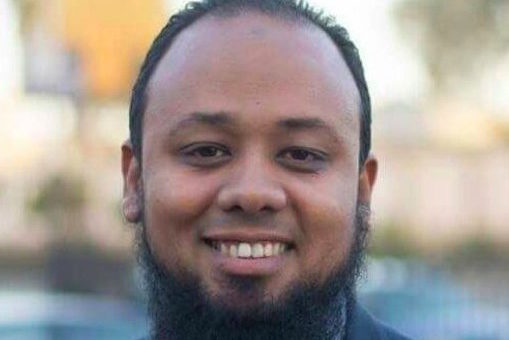
Oct 4, 2019 | News
The ICJ today called on the Egyptian authorities to immediately release all lawyers arrested for discharging their professional functions, and ensure they and other lawyers in the country are allowed to perform their work without threats or intimidation.
The Egyptian authorities have arrested more than 2400 people over the past two weeks following anti-government protests.
Many of the detainees’ lawyers have themselves been arrested, including Mahienour Al-Massry, Sahar Ali, Mohamed Salah Ajaj, Mohamed Al-Baqer (photo), Mohamed Helmy Hamdoun, Ahmed Sarhan, and Ahmed Abd El-Azim.
On 29 September, while representing prominent human rights defender Alaa Abdelafttah during questioning before the State Security Prosecution, lawyer Mohamed Al-Baqer was arrested and charged with, among other charges, “spreading false information aiming at disturbing the public and peaceful order” and “joining a terrorist organization.”
The ICJ has previously documented how lawyer Mahienour Al-Massry was arrested under similar circumstances, and called for her immediate release.
Mahienour was also charged with “spreading false information” and “joining a terrorist organization.”
“By arresting lawyers and prosecuting them on trumped-charges, the Egyptian military is dismantling the very last line of defense against its ruthless crackdown on human rights and fundamental freedoms, and silencing the very same voices that can still witness, challenge and report on its industrial-scale human rights abuses,” said Said Benarbia, ICJ MENA Director.
Under international standards reflecting core rule of law principles, lawyers must be able to discharge their professional functions without hindrance, harassment or improper interference.
They shall not suffer, or be threatened with prosecutions for any action taken in accordance with their professional duties.
The ICJ emphasized that these standards are there not only for the interests of the lawyers and those they represent or might in the future represent, but also to ensure that the rule of law remains operative for the society as a whole.
The Egyptian authorities must conform to these standards, refrain from its attacks against the legal profession, and immediately release all lawyers and other individuals arbitrarily detained.
Contact:
Said Benarbia, Director of the ICJ Middle East and North Africa Programme, t: +41-22-979-3817; e: said.benarbia(a)icj.org
Egypt-Attacks on Lawyers-News-web stories-2019-ARA (story in Arabic, PDF)
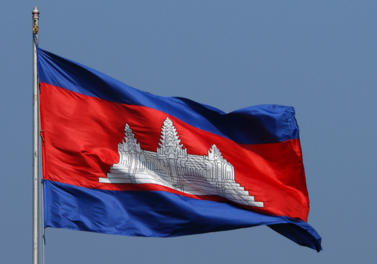
Oct 4, 2019 | News
Today, the ICJ and 36 other civil society organizations called on the Government of Cambodia to drop charges against former Radio Free Asia (RFA) journalists Yeang Sothearin and Uon Chhin, who are being tried on spurious charges for multiple offences in connection with carrying out their journalist functions.
This comes after the latest hearing in the case yesterday by the Phnom Penh Municipal Court, where it postponed delivery of its verdict for a second time. The Court has now ordered that the case be returned to a new investigating judge for a reinvestigation.
The case is emblematic of a pattern of instances where journalists, human rights defenders, community activists, members of the political opposition and others have been subjected to intimidation and harassment for exercising their fundamental freedoms through misuse of laws and the judicial system.
The ICJ and other organizations have called for a cessation of this practice and urged the government to comply with their obligations under international law to protect these freedoms.
The trial of the two journalists which concluded on 9 August, had initially been expected to result in a verdict on 30 August, before it was postponed until yesterday’s hearing, when it was again postponed.
“These charges should have never been brought against Yeang Sothearin or Uon Chhin – They were brought with the sole purpose of silencing their work as journalists and chilling other independent voices in the country from speaking,” said Frederick Rawski, ICJ’s Asia and Pacific Regional Director.
The ICJ has stressed that the case against journalists does not comply with Cambodia’s international legal obligations to respect the right to liberty and to a fair trial.
“Given the arbitrary legal bases upon which the journalists have been charged and tried, the prolonging of their case prolongs this harassment and additionally violates their right to be tried without undue delay,” said Rawski.
In November 2017, Yeang Sothearin and Uon Chhin were arrested and detained in Prey Sar prison before they were provisionally charged with “supplying a foreign state with information prejudicial to national defence” under Article 445 of Cambodia’s Criminal Code. In March 2018, they were further charged with alleged production of pornography under Articles 38 and 39 of the Law on the Suppression of Human Trafficking and Sexual Exploitation.
Both men face up to 16 years in prison. They are currently under judicial supervision, following their release on bail after being held in pre-trial detention for more than nine months.
The journalists were arrested following the shutdown of RFA’s Cambodia bureau in the midst of a sharp deterioration in the situation for human rights and the rule of law in Cambodia prior to the 2018 national elections.
In September 2017, in a statement to the UN Human Rights Council, the ICJ had highlighted that civil society, independent media and the political opposition were under sustained attack in a “carefully orchestrated effort to silence dissenting voices in the lead up to national elections” and that laws were “being weaponized to this end”.
In October 2017, the ICJ in a report on the human rights situation similarly warned that the government was “relying on judges and prosecutors who lack independence to silence dissent and dismantle democracy” through “an endemic system of political interference in high-profile cases and an equally entrenched system of corruption in all others”.
Following the national elections, this trend has only worsened.
In August and September 2019, the ICJ and other organizations highlighted the “ongoing human rights crisis” in Cambodia and called for strengthened scrutiny at the Human Rights Council of the human rights situation in the country.
Download
Cambodia-charges against journalist-news-webstory-2019-ENG (full story in PDF)
Link to Joint Statement available here.
Contact
Frederick Rawski, ICJ Asia and Pacific Regional Director, frederick.rawski(a)icj.org
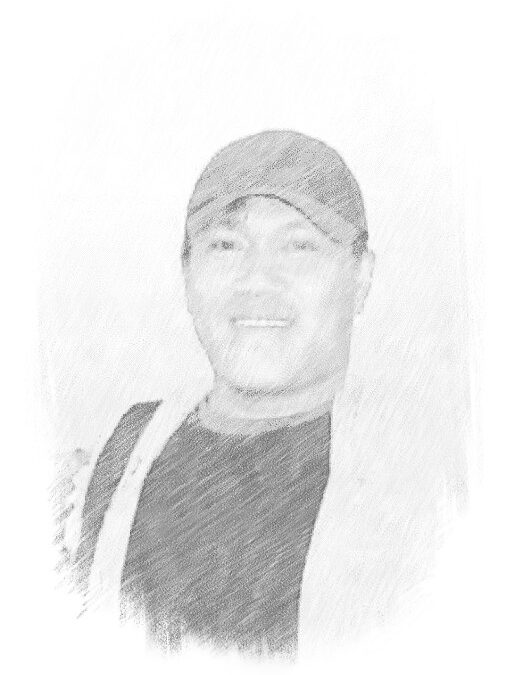
Oct 4, 2019 | Advocacy, News
Reform of the 1959 Defence Services Act is a necessary step to address ongoing military impunity. The case of Ko Par Gyi’s killing should be reopened to satisfy the State’s international law obligations and deter repetition of serious crimes by soldiers.
Five years after the death of journalist Ko Par Gyi, the ICJ calls on the Government of Myanmar to reform the 1959 Defence Services Act, which was used to shield soldiers from accountability for involvement in his killing.
“The case is emblematic of the 1959 Defence Services Act being used to enable impunity for human rights violations by soldiers throughout Myanmar, by transferring to military courts the authority to investigate and prosecute serious crimes against civilians,” said Frederick Rawski, Asia Pacific Region Director for the ICJ.
“Impunity for Ko Par Gyi’s death is another example of this law being used to shield soldiers from accountability for serious crimes,” added Rawski. “Legislators should reform the 1959 law to enable the public criminal prosecution of soldiers for serious crimes in all circumstances, and take other steps to address the accountability gap.”
After being detained by police in Mon State and transferred into military detention on 30 September 2014, Ko Par Gyi died four days later in the custody of Tatmadaw soldiers. Unceremoniously buried in a shallow grave, Ko Par Gyi’s death was hidden from his family and the public for weeks. Nobody has been held accountable for his death and his family lacks access to redress, including their right to know the truth.
A deeply flawed inquiry carried out secretly in military courts, pursuant to the 1959 Act, resulted in the acquittal of the soldiers allegedly involved. This effectively ended other efforts to hold the perpetrators accountable, including through an inquest at the Kyaikmaraw Township Court in Mon State. It also flouted the Myanmar National Human Rights Commission’s recommendation for a police investigation and public criminal trial to be undertaken by civilian authorities.
“Five years on, Myanmar authorities must finally initiate a thorough, independent and impartial investigation into the killing of journalist Ko Par Gyi,” said Sean Bain, legal adviser for the ICJ. “The truth must be established and recognized, and those responsible for his apparently unlawful killing need to be brought to justice in fair trials,” he added.
Several provisions of the 1959 Act are used to facilitate a transfer of cases involving military personnel from civilian to military courts, including for serious crimes against civilians. This has been used as a tool to avoid accountability in cases throughout Myanmar, such as its use to justify the early release of soldiers who were convicted by a military court in the killing of ten Rohingya civilians in Rakhine State in 2017.
International legal standards prohibit the use of military courts to try military personnel for gross human rights violations and crimes under international law. The detention and prosecution of journalists, based solely on their lawful activities undertaken while doing their job, violates the right to freedom of expression, and the rights to seek, receive and impart information and to participate in public affairs.
Myanmar authorities have an obligation to reopen the case of Ko Par Gyi with a view to establishing the circumstances of his death, as with any potentially unlawful killing by either State or non-State actors.
“By empowering civilian courts to oversee such cases, the NLD Government would send a powerful message to all justice sector institutions, including police, prosecutors and judges, that they can and should review potential crimes involving the military with independence and impartiality, in line with the rule of law,” added Bain.
The National League for Democracy (NLD)-led Government has the legislative authority to immediately reform the 1959 Act to align it with international standards. The ICJ has called for reform of this law, including by allowing the prosecution of soldiers for serious crimes to be undertaken under the jurisdiction of civilian courts.
See also:
ICJ, “The investigation and prosecution of potentially unlawful death: ICJ Practitioners’ Guide no. 14,” 14 September 2019, available here.
ICJ, “Achieving Justice for Gross Human Rights Violations in Myanmar – a baseline study,” 16 January 2018, available here.
Contact
Sean Bain, ICJ legal adviser, e: sean.bain(a)icj.org
Full statement with additional information, in English: Myanmar-Ko Par Gyi killing-Press-Releases-2019-ENG (PDF)
Full statement, in Burmese: Myanmar-Ko Par Gyi killing-Press-Releases-2019-BUR (PDF)
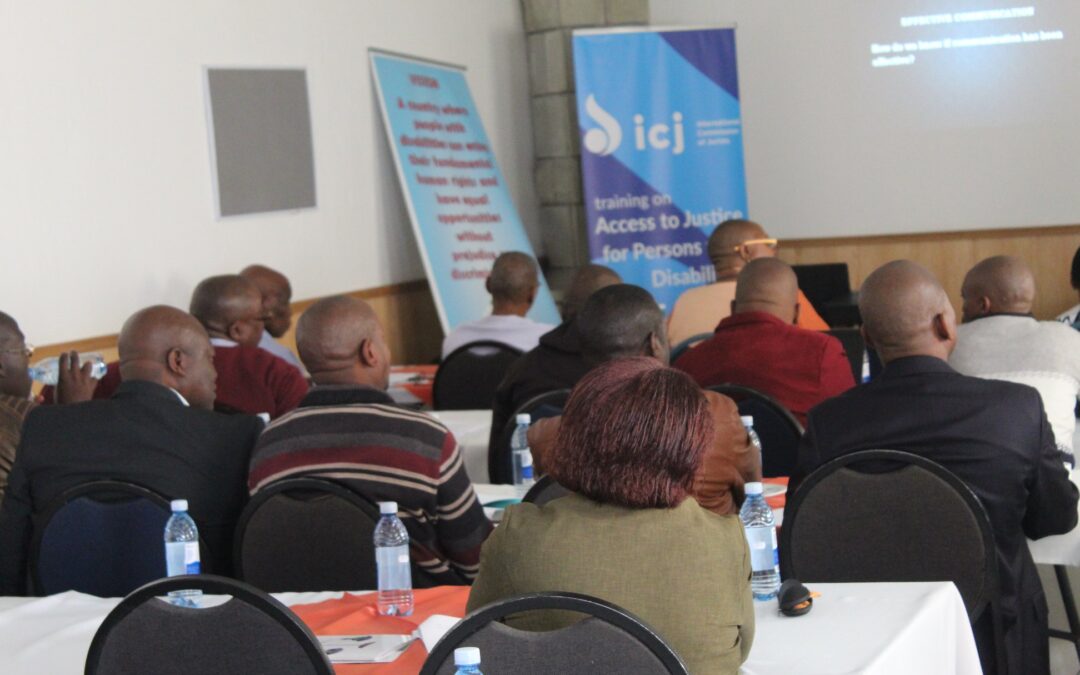
Oct 3, 2019 | News
From 1 to 3 October, the ICJ and the Lesotho National Federation of Organizations of the Disabled (Lnfod), an umbrella body of organizations for persons with disabilities, held a judicial training in Lesotho on the rights and access just to persons with disabilities.
The workshop was attended by judges, magistrates, disability law and policy experts, Lnfod and ICJ legal advisers and ICJ Commissioner Justice Charles Mkandawire.
At the workshop, the ICJ Legal Adviser Associate Nokhukanya Farise discussed on the UN international legal framework on access to justice for persons with disabilities at both the universal and regional levels. In this regard, the ICJ highlighted provisions related to access to justice of the International Convention on the Rights of Persons with Disabilities (CRPD), as well as the Protocol to the African Charter on Human and Peoples’ Rights on the Rights of Persons with Disabilities in Africa.
These instruments provide for a substantive right to access to justice for persons with disabilities under article 13.
In addition, they expand on the rights to non-discrimination and equality of persons with disabilities, as well as their right to equality and access to the physical environment, facilities, services and infrastructure required under article 9 of the CRPD.
Justice Charles Mkandawire of the High Court of Malawi and ICJ Commissioner, who attended the workshop and facilitated a session on the role of the judiciary, said: “The judiciary should be functional independently of the executive and legislature, and the relationship between all three should be characterised by mutual respect. The judiciary should also be impartial and independent to prevent the abuse of power.”
Lnfod has been actively working to secure access to justice for persons with disabilities in the criminal justice system of Lesotho. In the workshop, independent law and policy expert Dianah Msipa discussed the case of Koali Moshoeshoe and Others v DPP and Others, where Lnfod successfully challenged the constitutionality of Section 219 of the Criminal Procedure & Evidence Act No.9 of 1981 in the High Court (Constitutional Division).
That provides that persons with intellectual/psychosocial disabilities are not competent witnesses, denying them equal access to justice.
Lnfod explained the Court’s ruling that the legal barrier violated the right to equality before the law and was discriminatory on the basis of disability. It also disproportionately affected women and girls with intellectual and psychosocial disabilities as this rendered them vulnerable sexual abuse.
Lnfod indicated it hoped that the Koali Moshoeshoe case would act as a reformative judicial precedent which will be disseminated and implemented by the courts of law across the country.
“The shift towards the realization of the right to legal capacity for persons with intellectual/psychosocial presents a remarkable opportunity towards overall enjoyment of all the rights provided for in the United Nations Convention on the Rights of Persons with Disabilities on an equal basis with others,” Lnfod said in a statement delivered before the workshop.
At the workshop, independent disability law and policy expert Dianah Msipa explored the issues of understanding disability, the rights of access to justice for persons with disabilities, barriers to effective participation in the criminal justice system, and the use of accommodations in access to justice.
“The training was well-received by all the delegates and I am encouraged by the word of the delegates who stated that they would start providing accommodations to persons with disabilities,” Dianah Msipa said.
Contact:
Khanyo Farise, e: Nokukhanya.Farise@icj.org









